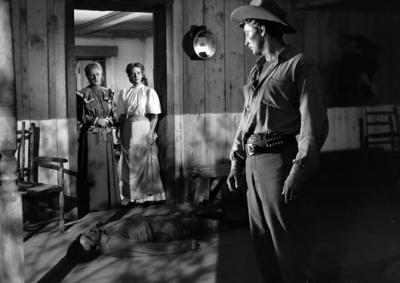Robert Mitchum liked to tell people that he only had two styles of acting: “With and without a horse.” It’s a beguiling statement, cannily in keeping with Mitchum's famously detached screen persona and nonchalant approach to his profession but also a subtle challenge, a provocation to discern finer distinctions in the method of an actor so often noted for having no method at all. In many ways, Mitchum’s enduring mystique rests almost entirely on his roles without a horse, specifically the laconic outsiders, the grifters and the drifters, he played in such film noir classics as The Locket (1946), Out of the Past (1947), His Kind of Woman (1951) and Angel Face (1952). Film noir, writes biographer Lee Server, was the genre where Mitchum’s “aura of brooding bemusement and simmering violence found a perfect home.” But if Mitchum found his home in noir, he got his start in Westerns, riding with the stock company behind William Boyd’s Hopalong Cassidy. His last film role was also in a Western, a dazzling cameo in Jim Jarmusch’s Dead Man (1995). In between, Mitchum’s enigmatic presence, at once rugged and sensuous, was the crucial, alchemical element in a number of auteur-driven classic Westerns that redefined the genre in the post-war years. This series plays along with Mitchum's self-mythologizing to highlight his “other” acting style, zeroing in on a selection of his Western work, particularly the transformative Westerns he made with such auteurs as Raoul Walsh (Pursued, 1947), Robert Wise (Blood on the Moon, 1948), William Wellman (Track of the Cat, 1954), Nicholas Ray (The Lusty Men, 1952) and Howard Hawks (El Dorado, 1966).
"Looking at Mitchum through the lens of the western offers an intriguing window on his talent, on the easy naturalism of his acting style and the cool way he used those famously heavy-lidded eyes to project an intensely masculine presence." —Los Angeles Times/blockquote>






 Mobile Navigation
Mobile Navigation









